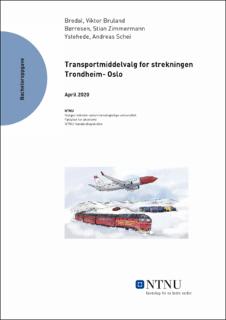| dc.contributor.advisor | Denstadli, Jon Martin | |
| dc.contributor.author | Bredal, Viktor Bruland | |
| dc.contributor.author | Børresen, Stian Zimmermann | |
| dc.contributor.author | Ystehede, Andreas Schei | |
| dc.date.accessioned | 2020-06-18T16:01:27Z | |
| dc.date.available | 2020-06-18T16:01:27Z | |
| dc.date.issued | 2020 | |
| dc.identifier.uri | https://hdl.handle.net/11250/2658721 | |
| dc.description.abstract | Formålet med denne oppgaven er å undersøke hvordan holdninger og egenskaper ved transporttilbudet påvirker evaluering av transportmidler. Oppgavens populasjon er studenter i Trondheim og vi har valgt å fokusere på strekningen Trondheim-Oslo. Vi har valgt et kvantitativt undersøkelsesdesign og brukt et digitalt spørreskjema for å hente inn data. Hoveddelen av undersøkelsen bestod av en conjoint-analyse der respondentene ble bedt om å rangere hypotetiske reisealternativer. Oppgavens utvalg utgjør totalt 191 respondenter.
Hovedfunnet for oppgaven var at utvalget gjennomsnittlig vektet pris tyngst for de hypotetiske reisealternativene. Vi fant også ut at det var positiv korrelasjon mellom vekting av CO2-utslipp og miljøholdninger. Ved undersøkelse av faktiske reisevaner viste det seg at de fleste respondentene reiste mer med fly enn med tog. Respondenter med mer positive miljøholdninger reiste mindre med fly enn de med mer negative miljøholdninger, men de reiste likevel mer med fly enn med tog. | |
| dc.description.abstract | The purpose of this thesis is to investigate how attitudes and characteristics of transport-services influence the evaluation of means of transport. The population of this thesis has been limited to students in Trondheim and we have focused on the distance Trondheim-Oslo. The thesis uses a quantitative research design with a digital questionnaire to collect data. The main part of the survey consisted of a conjoint analysis in which were the respondents were asked to rate hypothetical travel options. The sample size of this thesis consists of 191 respondents.
The main finding of the thesis was that the sample in average valued price strongest for the consideration of the hypothetical travel alternatives. We also found that there was a positive correlation between the valuation of CO2 emissions and environmental attitudes. When examining actual traveling behaviour, it was found that most respondents traveled more by airplane than train. Respondents with more positive environmental attitudes traveled less by airplane than those with more negative environmental attitudes. Despite this finding, we found that this group also traveled more frequently by airplane than train. | |
| dc.publisher | NTNU | |
| dc.title | Transportmiddelvalg for strekningen Trondheim - Oslo | |
| dc.type | Bachelor thesis | |
